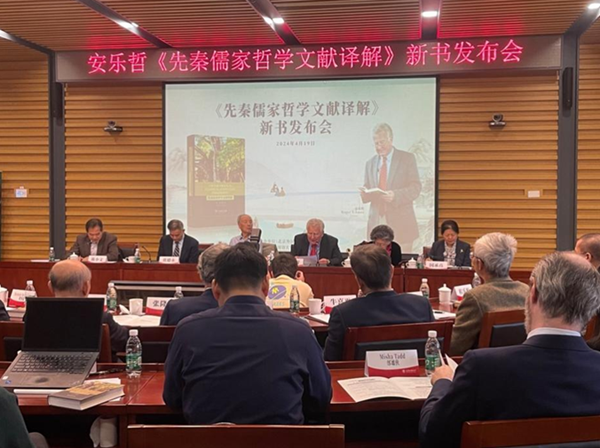- Research
- Research Centers
- Journals
- Admission
- Introduction
- Programs
- Application
- Alumni & Giving
- Alumni Club
- Giving

Roger T. Ames presents his new book at the launch event. [Photo by Yao Yuxin/chinadaily.com.cn]
Chinese philosophy is often misunderstood in the West because of inaccurate translations that fail to do justice to the cultural context of Chinese philosophical classics, Canadian-born Sinologist and philosopher Roger T. Ames said at the launch of his new book — "A Sourcebook in Classical Confusion Philosophy" — in Beijing on Friday.
As Chinese philosophical terms lack exact equivalents in English, previous translators typically applied Western concepts and frameworks when translating Chinese classics, said Ames, a humanities chair professor at Peking University and vice-chairman of the International Confucian Association.
For instance, terms like "tian" (天) and "li" (礼) have been translated as "heaven" and "ritual", which carry religious connotations, leading to misconceptions about Chinese philosophy in the West, Ames said.
Instead, he emphasized the importance of understanding Chinese philosophy on its own terms rather than through the lens of Western philosophy.
As a curated compilation of representative texts from nine pre-Qin (before 221 BC) Confucian philosophical works, including the "I Ching", "Great Learning", "Analects", "Mencius", "Doctrine of the Mean", "Classic of Filial Piety", "Five Elements", "Mozi", and "Xunzi", the book presents the original texts alongside English translations in a bilingual format and offers comments on the core concepts and thoughts of each section.
Ames said the book aims to correct the misinterpretations about Chinese philosophy in the Western world, restoring the true essence of Chinese philosophical thought, which holds significant importance for the translation of Chinese classics and cross-cultural communication.
"Chinese philosophy is an integral part of world philosophy," he said, "I want to encourage the world to better understand and appreciate Chinese traditional culture."
The book launch, jointly organized by the Beijing Foreign Studies University and the Commercial Press, brought together dozens of scholars from both China and abroad.